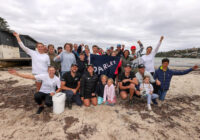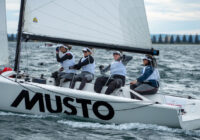International Day for Women in Maritime Shaping the Future of Maritime Safety
Today the Australian Maritime Safety Authority (AMSA) has joined the global community in commemorating International Day for Women in Maritime, to celebrate both the rich history and promising future of women’s contributions to the maritime sector.

This year the theme of the International Maritime Organisation’s International Day for Women in Maritime is ‘Safe Horizons: Women Shaping the Future of Maritime Safety’.
AMSA’s Executive Director Policy and Regulation Leanne Loan is AMSA’s Diversity and Inclusion Champion, leading AMSA’s efforts to advance diversity and inclusion within the organisation and across industry.
‘Today is an opportunity to honour the remarkable achievements of women in the maritime sector while advocating for gender equality and inclusivity in this vital industry,’ says Ms Loan.
As an island nation, 99% of our exports travel by sea. Maritime trade is essential to our economy.
Ms Loan says the sustainability of the global maritime industry depends on attracting the best people regardless of gender, to bring innovative ideas and fresh perspectives for the sector to thrive.
‘Women are crucial in the maritime industry, as seafarers, port-based workers, maritime policy professionals, and science and technical experts,’ she says.
‘We recognise the incredible achievements made by women in the maritime sector already, trailblazers who have reshaped the industry and inspire others to follow in their footsteps.
‘Elevating female role models, embracing diverse perspectives, and fostering collaboration, is vital to a safer, more inclusive maritime sector.
‘We also recognise the invaluable contributions of Aboriginal and Torres Strait Islander peoples, whose knowledge and traditional practices enhance safety at sea. By learning from Indigenous communities, we strengthen our commitment to cultivate a culture of safety within the maritime industry,’ she says.
Numbers of females participating in the maritime industry remain low at 1.2% of the total maritime workforce globally. There has been some notable progress—female employees in seagoing roles have increased by 45.8% since 2015. However, with the overall percentage of women employed in both shore-based and seafaring roles so low, there is still much work to be done.
While research consistently demonstrates that diverse teams foster greater efficiency, innovation, and job satisfaction, women in the maritime sector still face challenges including sexual harassment, assault, and discrimination.
‘Removing these issues is essential to creating a psychologically safe environment, particularly for isolated workers such as seafarers,’ says Ms Loan.
‘Today, as we celebrate the contributions of women in maritime, let us recommit ourselves to building a future where all individuals have equal opportunities to thrive.’
For more information on AMSA’s efforts to achieve gender equity visit amsa.gov.au/women-maritime









